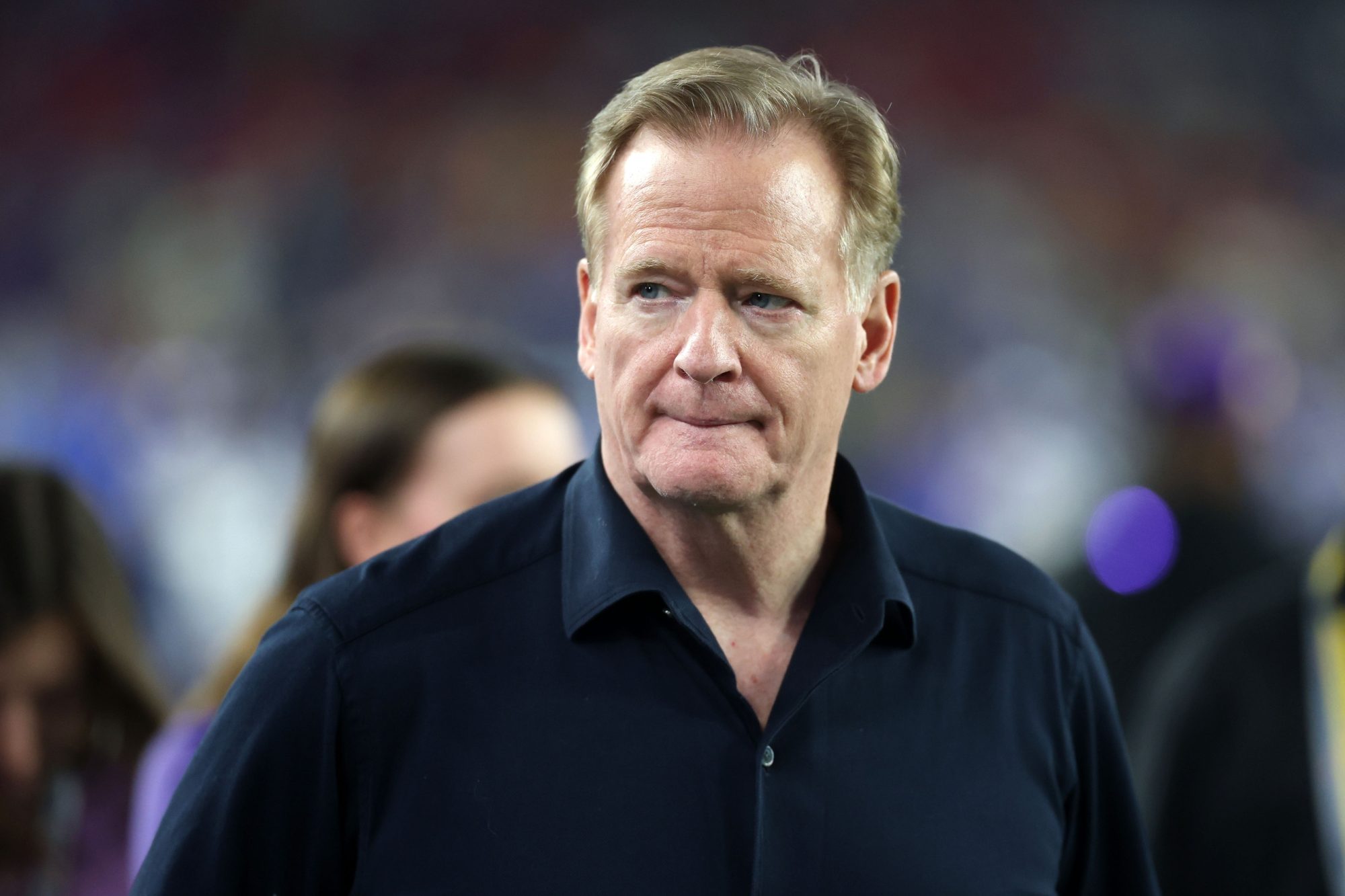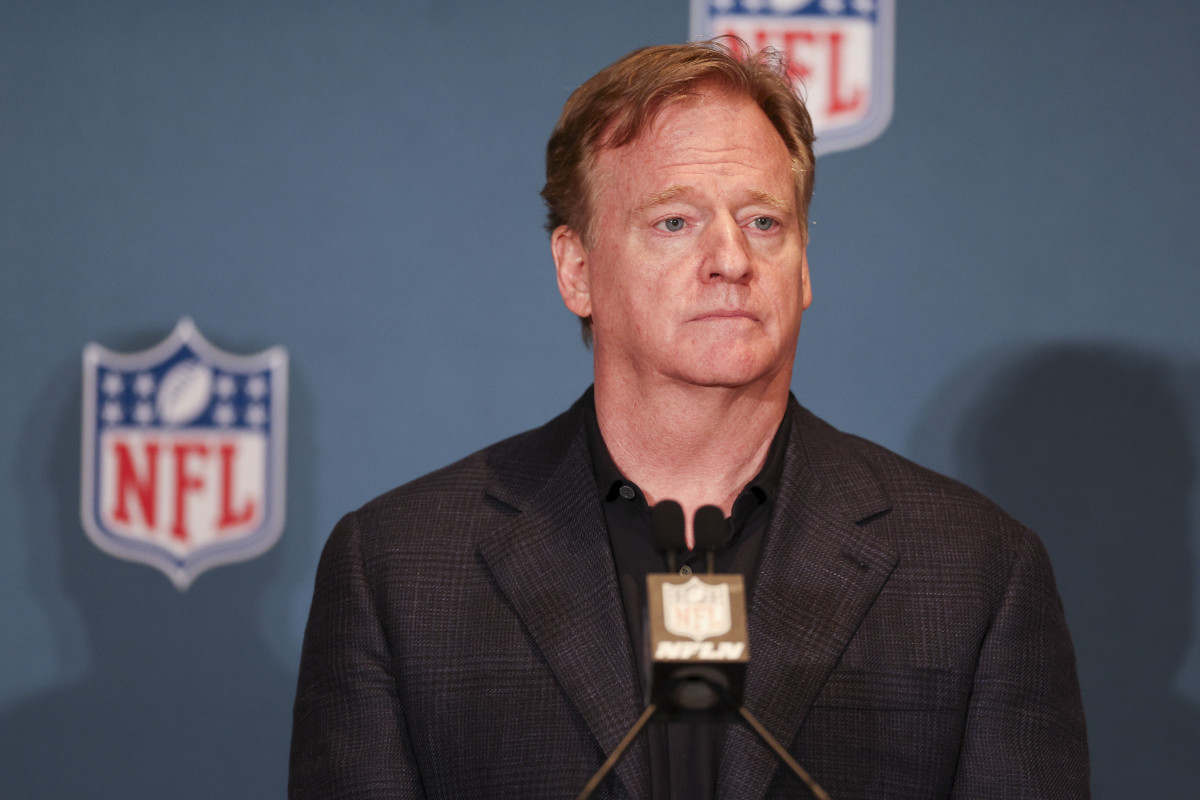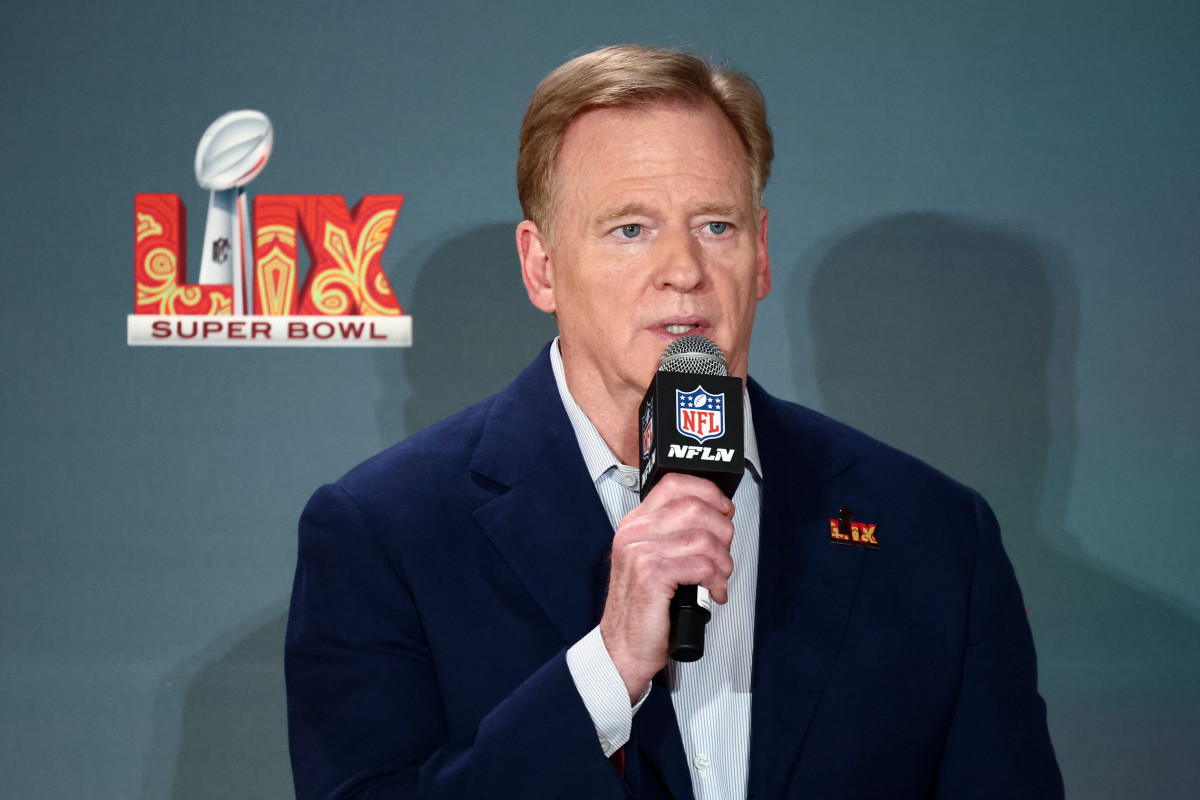For a good while now, the name Roger Goodell has been closely tied to the National Football League, serving as its commissioner. He took on this big role back in 2006, guiding the league through many changes and keeping things running on the business side. It's a position that comes with a lot of responsibility, overseeing a massive sports organization that captures the attention of so many people.
This individual, a businessman from America, has been at the helm for quite some time, helping to shape the direction of professional football. His tenure has seen the league grow in wealth and reach, becoming an even bigger presence in the world of sports and entertainment. People often wonder about the person behind such a significant job, the one making key decisions for a widely watched sport, you know?
From his beginnings with an internship to leading one of the biggest sports groups, Roger Goodell's path shows a steady rise within the NFL's structure. His continued presence, marked by contract extensions, suggests a long-term commitment to his work and the league's future plans, more or less.
Table of Contents
- The Story of Roger Goodell
- What Does a Commissioner Do - Roger Goodell's Role?
- How Has the NFL Grown Under Roger Goodell's Watch?
- Why Are Contract Extensions Important for Roger Goodell?
- How Does Roger Goodell Handle League Disagreements?
- The Business Side of Roger Goodell
- The Lasting Impact of Roger Goodell on the NFL
- Looking Ahead with Roger Goodell
The Story of Roger Goodell
Roger Stokoe Goodell, born on the nineteenth day of February in 1959, is an American person known for his work in business. He has held the top spot as the commissioner for the National Football League, which many people just call the NFL, since the year 2006. This means he has been overseeing the operations of this very popular sports organization for a good number of years now, so.
His connection to the NFL actually began quite early in his working life. He managed to get an internship with the league, which is how he first got his foot in the door, as a matter of fact. This initial step proved to be a really important one, setting him on a path that would eventually lead him to the highest position within the organization. It shows a kind of steady climb through the ranks, doesn't it?
The moment he officially took on the commissioner's duties was on the eighth of August, 2006. However, some records also point to September 2006 as the start of his formal time in that role. Regardless of the exact day, the key point is that he has been the one guiding the NFL for a very long stretch of time, making big decisions and helping to steer its direction, basically.
His background as a businessman, you know, has been a central part of his ability to lead such a large and widely watched sports group. It's not just about the games on the field; there's a whole lot of financial dealings and organizational tasks that fall under the commissioner's watch. He's the one who helps make sure the league's operations run smoothly from a money and management point of view, too it's almost.
Personal Details and Background
| Full Name | Roger Stokoe Goodell |
| Date of Birth | February 19, 1959 |
| Primary Role | Commissioner of the National Football League (NFL) |
| Began Commissioner Role | 2006 |
| Current Contract Extends Through | 2027 |
What Does a Commissioner Do - Roger Goodell's Role?
Being the commissioner of a major sports group like the NFL means a person has a lot on their plate. For Roger Goodell, this involves overseeing a huge operation that includes thirty-two teams, many thousands of players, and a fan base that stretches across the globe. It's about keeping the whole enterprise running, from the way games are played to the way money is managed, you know?
A big part of his job involves making sure the rules of the game are upheld and that the league operates fairly for everyone involved. This can mean making tough calls about player conduct or team actions. It's a position that requires someone to be the ultimate decision-maker for many different situations that come up within the world of professional football, as a matter of fact.
He is also the main face of the league when it comes to dealing with the public, the media, and other organizations. This means he often speaks for the NFL on important matters, explaining decisions and representing the league's overall goals. It’s a very public role, and one that asks for someone to be ready to address a lot of different issues that might pop up, basically.
Beyond the public appearances, there's a lot of behind-the-scenes work. This includes managing the league's staff, working with team owners, and making plans for the league's future growth. It's about setting a path for where the NFL is headed in the years to come, and that takes a lot of thought and coordination, in a way.
His duties also involve making sure the league stays financially sound and continues to bring in a good amount of money. This means looking at things like television deals, sponsorship agreements, and how tickets are sold. It’s a very business-focused aspect of the job, keeping the money side of things in good order, more or less.
So, when you think about what a commissioner like Roger Goodell does, it's a mix of being a leader, a manager, a rule-setter, and a public representative. It's a job that touches on almost every part of the NFL, from the smallest detail to the very biggest plans for its future, and stuff.
How Has the NFL Grown Under Roger Goodell's Watch?
Under the leadership of Roger Goodell, the National Football League has seen a significant increase in its financial well-being. The text mentions that the NFL is "growing richer and richer," which points to a time of great financial success for the organization. This kind of growth usually means more money coming in from various sources, making the league more valuable overall, you know?
A big part of this financial expansion can be seen in the league's overall worth. The reference to Roger Goodell as the "N.F.L.’s $20 billion man" really highlights the huge amount of money that the league is now bringing in. This kind of figure shows just how much the NFL has become a powerhouse in the sports and entertainment world, pretty much.
This growth isn't just about the money; it also means the league has become more widely known and watched. When a sports group gets richer, it often means more people are tuning in to watch the games, buying merchandise, and generally paying more attention to what's happening. This helps the league reach new fans and keeps the existing ones very engaged, so.
The money coming in helps the league do many things, like invest in new technologies for broadcasting games, or even support programs that help communities. It means the NFL has more resources to put back into the sport, which can lead to better experiences for both the players and the people who watch them play, at the end of the day.
So, the idea that the NFL is getting richer under Roger Goodell's guidance speaks to a period where the league has been very successful in its business dealings. It suggests that the decisions made at the top have helped to increase the league's financial strength and its overall standing as a major global sports entity, you know?
This kind of financial success is often a sign of good management and a clear vision for how to keep a large organization moving forward. It points to a time when the league has been able to make deals and plans that have really paid off, allowing it to expand its reach and its wealth considerably, literally.
Why Are Contract Extensions Important for Roger Goodell?
The news that Commissioner Roger Goodell has agreed to a new contract with the league, extending his time through 2027, is a pretty significant piece of information. When a leader gets their contract extended, it usually means that the people they work for are happy with the job they are doing and want them to continue in that role. This shows a vote of confidence in his leadership, doesn't it?
An extension like this also brings a sense of stability to the league. Knowing that the same person will be at the top for several more years helps everyone involved – from team owners to players and even fans – understand who is guiding the ship. It removes uncertainty about who will be making the big decisions, which can be a good thing for any large organization, in a way.
The league itself made a public statement about the extension, saying that Goodell's contract was stretched out for three more years. This kind of public announcement is a way of telling everyone that the league's leaders have a clear plan for the future and that Roger Goodell is a central part of that plan. It’s about signaling continuity and a shared vision, basically.
For Roger Goodell personally, securing a new contract means he can continue to put his long-term plans for the NFL into action. It gives him the time needed to see through various projects and initiatives that might take years to fully develop. It's about having the space to keep working on the league's direction without having to worry about his own job security, kind of.
It also suggests that the league's owners believe his continued presence is good for the NFL's financial health and its overall standing. Given the league's growth in wealth, keeping the person who has been at the helm during that period makes a lot of sense from a business point of view, right?
So, these contract extensions are not just about one person's job; they are about the league's strategy for its future. They show a commitment to the current leadership and a belief that Roger Goodell is the right person to keep guiding the NFL through whatever comes next, honestly.
How Does Roger Goodell Handle League Disagreements?
One of the many responsibilities that fall to the commissioner of the NFL is dealing with disagreements and tricky situations that come up within the league. The text mentions that a dispute over shares purchased by the late Andrew McKenna "could set off a dispute that NFL commissioner Roger Goodell will have to handle." This points to his role as a sort of problem-solver or mediator for important issues, you know?
When something like a dispute over shares happens, it often involves complicated legal or financial matters that need careful attention. It's the commissioner's job to step in and find a way to sort things out, making sure that the league's rules are followed and that a fair outcome is reached for all the people involved. This is a very important part of keeping the league running smoothly, too it's almost.
Handling these kinds of situations means he has to listen to different sides of an argument, gather all the necessary information, and then make a decision that he believes is best for the overall health and fairness of the NFL. It's about being the person who can bring a resolution to conflicts, preventing them from causing bigger problems for the organization, in a way.
These disputes can sometimes involve team owners, players, or even outside parties, so the commissioner needs to have a good grasp of many different areas. His ability to step into these situations and work towards a solution is a key aspect of his leadership. It shows his role in maintaining order and ensuring that the league operates with a clear set of guidelines, as a matter of fact.
The fact that he "will have to handle" such a dispute suggests that this is a regular part of his job. It's not just about celebrating successes; it's also about dealing with the difficult parts of running a major sports business. It means he's the one who steps up when there's a disagreement that needs a definitive answer, pretty much.
So, his role in managing disagreements is about ensuring that justice is served within the league's framework and that any issues are resolved in a way that allows the NFL to continue its operations without major disruptions. It's a critical part of maintaining the league's integrity and its professional standing, obviously.
The Business Side of Roger Goodell
Roger Goodell is consistently described as an American businessman, and this background is very central to his role as the NFL commissioner. Being a businessman means he brings a particular set of skills to the job, skills that go beyond just understanding the game itself. It's about the financial workings, the deals, and the overall management of a massive enterprise, you know?
His business sense is likely what has helped the NFL become "richer and richer" during his time at the top. This involves making smart choices about where the league gets its money from, like television rights, advertising deals, and partnerships with different companies. It’s about seeing opportunities to make the league more profitable and then acting on them, basically.
Running a sports league of the NFL's size is very much like running a huge corporation. There are budgets to manage, revenues to increase, and expenses to control. Roger Goodell's role as a businessman means he is responsible for these financial aspects, ensuring the league stays on solid ground and continues to grow its economic footprint, as a matter of fact.
This also includes looking at ways to expand the NFL's reach, perhaps into new markets or through new types of media. A businessman thinks about how to make a product or service more appealing to a wider audience, and for the NFL, that means making football more accessible and enjoyable for more people, too it's almost.
He is the one who helps negotiate important agreements that affect the league's finances, such as collective bargaining agreements with players or contracts with broadcasters. These are complex discussions that require a keen understanding of numbers and long-term financial impacts. It’s about getting the best deals for the league, in a way.
So, the business side of Roger Goodell is about his ability to manage the financial health and growth of the NFL. It's about his experience in making money-related decisions that have helped transform the league into the powerful financial entity it is today, a sort of guiding hand for its economic success, right?
The Lasting Impact of Roger Goodell on the NFL
Roger Goodell has been the commissioner of the National Football League since 2006, which means he has had a very long period to shape the league. His time at the top has certainly left a mark on how the NFL operates and how it is seen by the public. This kind of long tenure allows a leader to really put their vision into practice, you know


